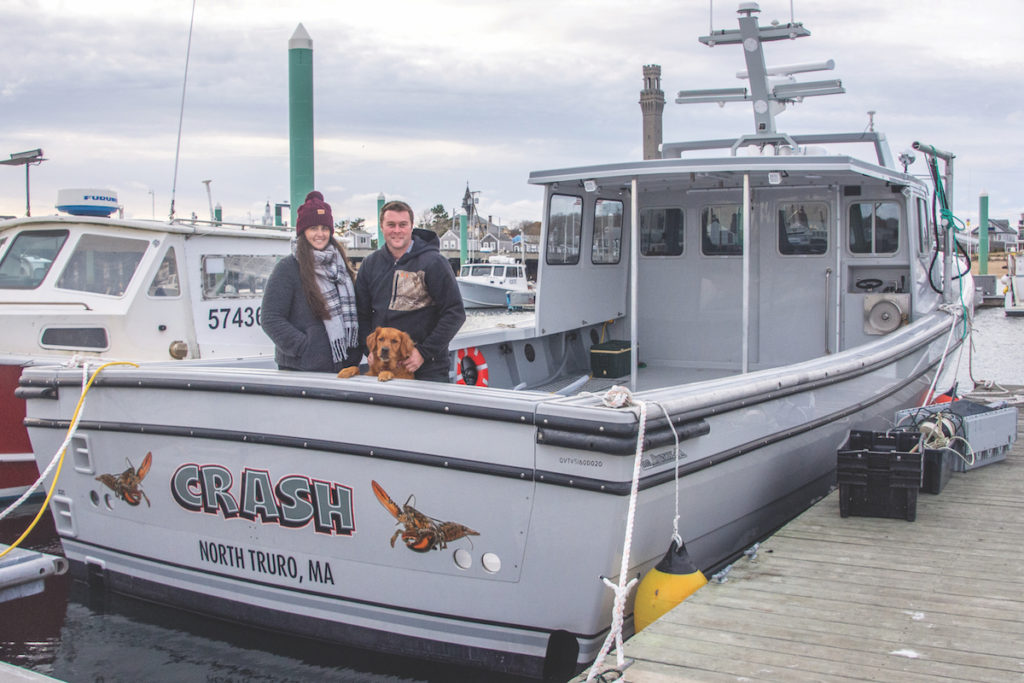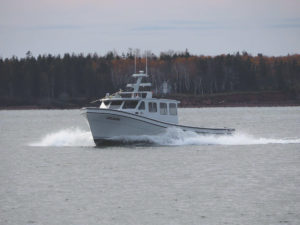
PROVINCETOWN — Jeff Souza came in hot one quiet November evening at MacMillan Pier. He was at the helm of his brand-new lobster boat, Crash, a custom-made Provincial 45’, which he’d boarded for the first time the day before in Rockland, Maine.
“How close am I, Pa? I’m so nervous,” yelled Souza, as he maneuvered the boat and backed it into the slip. A lobster boat captain for 15 years and boat owner for 18, Souza did not see banging up his new boat as an option.
On the dock watching were Souza’s wife, Rachel, his mother, Cheryl, and his father, Billy, who’d just picked up the rope when he heard his son shout again over the roaring diesel engine: “Let go of that thing! I need to see if I can do this on my own!”
Head over his shoulder, hands on the unfamiliar controls, soon enough the younger Souza docked and tied up, completing a years-long process of buying and shipping a boat out of Prince Edward Island in Canada.
A fourth-generation lobsterman and lifelong resident of North Truro, Souza is taking his family’s lobstering legacy to a new level. The Crash now casts a shadow over its neighbor, his father’s Harris 36’, the Raider III, on which Jeff first began lobstering.
“I went from being his mate and eventually he’ll be my mate,” said Jeff with a grin — and an obvious sense of relief that the boat had finally made it home.
The 160-mile journey through 10-foot waves in the Gulf of Maine was just the final piece of the complicated puzzle that buying a Canadian vessel during a global pandemic had become.
Looking to expand his lobster operation by replacing a 1973 Harris 36’ that matched his dad’s, and of which he was the fourth owner, Jeff put his name on a wait list at Provincial Boat and Marine, Ltd., the oldest boat maker in eastern Canada, five and a half years ago.
In 2018, he began meeting with the boat makers and putting together the features of his boat. It was ready to be built in April, just as the pandemic took off, and with Souza stuck at home. He’d stand inside his house and stretch out his arms, imagining how far the controls should be from where he hauled in his traps. He’d then relay his ideas to the boat makers on Prince Edward Island.
“I was supposed to be up there at least three or four times while it was being built, and then for the sea trials before bringing it home,” said Jeff. But Canada was locked down tightly against Covid-19, and the island barred him from coming ashore, even to pick the boat up and steam it home.

The boat went on a truck to Rockland, Maine, where Souza, his father, and close friends Brian Reeves, who owns PJ’s Restaurant in Wellfleet, and David Malchman put the new boat in the water.
“My wife happened to remind me that we were leaving port on Friday the 13th,” said Malchman. That was something he knows the old-timers would not have sanctioned. “Growing up in town, I remember the fishing fleet tied up at the wharves on Fridays,” he said.
The four began reassembling what had been dismantled for shipping. With a seven-page manual and their seaworthy intuition, they remounted the radar mast, the spoiler, lift and boom, and handrails, and then wired it up and hit the open waters for the first time, learning the new controls as they went.
“The steering and navigation is all computerized,” Malchman said, before heading to Rockland. “A human backup will be a good safe element to have aboard.”
Floating at 45 feet long, 14 feet wide, the boat is equipped with an 800-horsepower Scania diesel engine, state of the art Furuno navigational systems, and a refrigerated seawater system to keep the lobsters cool.
“The seawater warming up has been killing a lot of our lobsters,” explained Jeff. “If it works the way it’s supposed to, it’ll keep our catch so much better. We are going to be the guinea pigs for this one.”
To design his ideal boat, Jeff drew on popular features from both Canadian and American lobster boats — for example, a piston trap lander to easily haul up traps common on Canadian boats, and a rope locker and hot box, where the rope can be coiled up under deck and then heated to kill off any growth.
“Some of the stuff I told them to put on my boat they’d never seen before up there,” said Jeff. “I’m hoping that we found a happy best of both worlds.”
The sheer size of the boat is enough to upgrade his entire operation; it can now hold three times the number of traps as his old boat. “If I can take out triple the number of traps on one good day in the fall or spring, I’ll be saving a ton of time and money,” he explained.
And with new regulations to protect the endangered right whale soon forcing all lobstermen to switch to trawl — a single line with multiple traps attached — Jeff is well-equipped for the costly transition.
“My old boat was really good to me,” he said. “But I was going to have to modify my old boat anyways to adhere to the coming regulations.”
Jeff will soon be the only Souza captaining a boat on the water. Just last year, his parents, Billy and Cheryl Souza, ended their 34-year-long business of selling lobsters out of their garage. As Billy slowly retires from lobstering aboard the Raider III, he plans to transition to working part-time for his son’s business, Crash Seafood Inc.
Billy Souza is at peace with that. “Hey, at least I’m not paying for that new boat,” he said.



